Reviews
Ernst Lubitsch
USA, 1938
Credits
Review by Evan Kindley
Posted on 21 February 2011
Source Universal DVD
Categories Brackett & Wilder
Why do you think a woman puts a man in a straitjacket? Because she loves him.”
The opening of Bluebeard’s Eighth Wife is justly famous. We’re on the French Riviera, circa 1938; Gary Cooper is Michael Brandon, a wealthy American investor in the market for some pajama tops. He does not want the bottoms, a matter on which he is perfectly emphatic: “It’s not a question of price, it’s a matter of principle! This pajama business is a racket! 90% of the male population don’t sleep in pajama pants, don’t want pajama pants, yet buy pajama pants!” Brandon’s “revolutionary request” leads the store clerks to consult with a series of ever higher up higher-ups (an inspired gag that anticipates Mr. Show’s structurally similar “Change for a Dollar” sketch by a good sixty years), culminating in the store’s owner, who bellows into the phone: “Oh no, never, never. That is Communism!” The day is saved, however, by Claudette Colbert as Nicole de Loiselle, a down-at-heel young noblewoman who steps in to purchase the pajama bottoms — not for her father, brother or husband, the scandalized Brandon soon learns, but for her lover.
The scene has earned its reputation not only on its own merits but also for its perfect allegory for the Brackett/Wilder collaboration itself: it’s a “meet cute” that cutely sums up the meeting of its own makers, who together were able to compensate for each other’s lacunae (even if director Ernst Lubitsch came up with the grace notes, like the owner’s exclamation). What follows this opening is less celebrated, even by its creators. (“It was not a very good picture, but it was kind of all right,” Wilder would equivocate to Cameron Crowe five decades later.) Brandon falls for the sassy Nicole, who he encounters again when her father, the Marquis de Loiselle, sells him a Louis XIV bathtub. He proposes and she accepts, but she begins to have misgivings when she learns that, like Bluebeard the pirate in Charles Perrault’s fairy tale, he’s been married seven times before. (“Seven marriages and seven divorces!” “Only six. One died.”) Nicole agrees to go along with the wedding, but is determined to put Brandon through hell, which she does by denying him sex (“If you’d be a little nicer to me, I wouldn’t have to buy all these books”) and contriving it to look as if she’s stepping out on him. Frustrated, he slaps her; she slaps him back; he spanks her; she bites him; he tells her he hates onions, and she kisses him exactly once, after chomping on a bouquet of scallions.
As such acts of petty brutality would suggest, Bluebeard’s Eighth Wife is a pretty scrappy little movie, often very funny but a good deal less mature than the later Brackett/Wilder efforts. It’s even immature for a screwball comedy: next to the effortless elegance of something like Howard Hawks’ Bringing Up Baby (released the same year) or Leo McCarey’s The Awful Truth (the year before), Bluebeard’s Eighth Wife is pure Punch and Judy, with the battle of the sexes simply assumed and then livened up by a raft of double entendres, daffy characterizations, and ineffable Lubitsch touches. (By Wilder’s own account, Lubitsch supplied many of the film’s best jokes, though it’s hard to know how much of this is modest deference towards his mentor.) A random sampling: a dispenser of cologne telling Brandon that “the man who smells is the thing of the future”; Nicole’s cure for insomnia — “You take a long word, like ‘Czechoslovakia’ for instance, and you spell it backwards” — which sets up the title card a few scenes later that reads “If you go to Czechoslovakia for your honeymoon and still have to spell ‘Czechoslovakia’ backwards, there must be something wrong — and not with Czechoslovakia”; Brandon replying to Nicole’s “You buy wives just like shirts” with “Don’t talk yourself into a laundry complex!”; and, of course, the addled stockbroker who thinks he’s a chicken (“The other day I flew into the kitchen and said, ‘Anna, where are the noodles? Quick, make soup out of me!’”). The density of non sequiturs eventually approaches Groucho Marx levels.
It has to be said that, while they’re already superlative gag writers, Wilder and Brackett don’t seem quite comfortable with the romantic comedy genre here (though to be fair they would do far better, and again with Cooper, on 1941’s Ball of Fire) where the relation between the central couple has to be a matter of enormous import. Colbert and Cooper make a decent double act but don’t have the chemistry of the great screwball couples; the pleasure of Bluebeard’s Eighth Wife is not in their interactions but the doodles in the margins, the little details somebody (Wilder? Brackett? Lubitsch?) tossed out in a spitball session that found their way into the perfectly inconsequential proceedings because — why not? While Colbert’s duplicitous Nicole is not worlds away from similarly scheming dames in Bringing Up Baby or The Lady Eve, Brackett and Wilder have not made her nearly as likable as either of those ladies; it seems clear that the filmmakers’ sympathies are with the put-upon Brandon rather than his troublemaking bride. The film’s title is a total misdirect: the Bluebeard of Perrault’s story is a tyrannical murderer, but in Brackett, Wilder and Lubitsch’s film Brandon is less vicious than hapless (and maybe a little too picky); on the contrary, it’s Nicole who’s the aggressor and tormentor, for the most part. (Not that it’s quite as S&M as all that: it’s more like she’s Bugs Bunny to his Elmer Fudd.)
Bluebeard’s Eighth Wife is, nonetheless, not a bad start for a team that would go on to master tone, nuance and emotional resonance as capably as they tackled the rudiments of male/female badinage here. Everyone involved would make better films — look no further than the next year’s classic Ninotchka, Brackett and Wilder’s second and final collaboration with Lubitsch — but there is more than enough spark here to keep things in motion. “I feel fine; it was a nice day yesterday, it’s a nice day today, it’ll be a nice day tomorrow,” recites poor old Brandon after suffering a nervous breakdown and being committed to Professor Urganzeff’s sanatorium. “I feel fine, I feel fine, I feel very fine.” Bluebeard’s Eighth Wife is, like that mantra, a little rote, though it is indeed fine, and sometimes very fine. But it would be a nicer day tomorrow.
More Brackett & Wilder
-
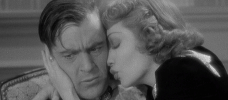
Bluebeard’s Eighth Wife
1938 -
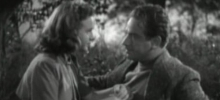
That Certain Age
1938 -

Midnight
1939 -
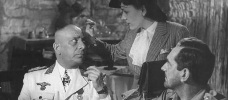
Five Graves to Cairo
1943 -
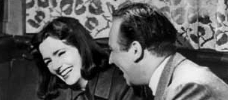
Ninotchka
1939 -
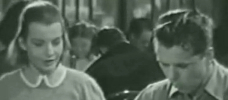
What a Life
1939 -
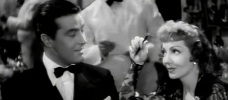
Arise My Love
1940 -
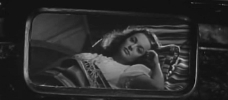
Hold Back the Dawn
1941 -
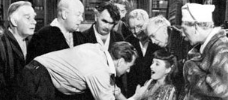
Ball of Fire
1941 -
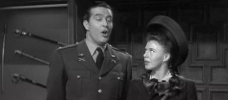
The Major and the Minor
1942 -
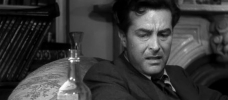
The Lost Weekend
1945 -
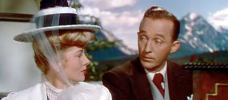
The Emperor Waltz
1948 -
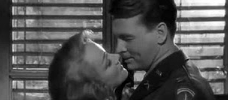
A Foreign Affair
1948 -
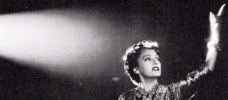
Sunset Boulevard
1950
We don’t do comments anymore, but you may contact us here or find us on Twitter or Facebook.



